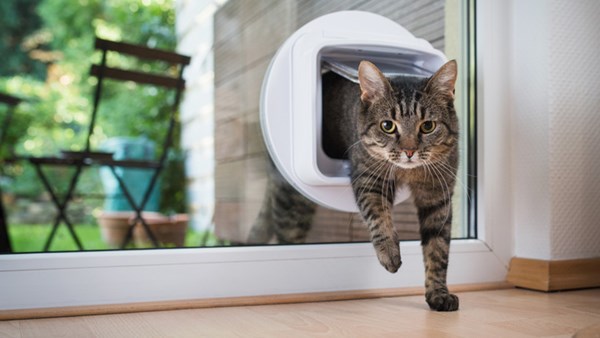Worms In Cats
Worms in cats can cause health problems in cats and should be treated as soon as possible. Find out how to spot the signs of worms in cats and how best to treat them.
Worms in cats
No cat owner likes to think about their beloved feline getting worms, but it’s surprisingly common. Most cats are affected at some stage in their lives, but prompt, regular treatment can stop the wriggly little creatures from coming back.
Finding worms might be an unpleasant experience for you, and worse for your cat if left untreated, causing them unnecessary pain and discomfort.
Thankfully, most worm infestations aren’t serious and are easily dealt with, reducing the chances of reinfection in the future.

Signs and symptoms of worms in cats
Some cats stay symptom free but plenty of others suffer from a range of ailments including
- Stomach pain
- Irritated eyes
- Diarrhoea
- Weight loss
- Anaemia
- Skin lesions
- Coughing
- A poor, unhealthy appearance
Early signs in kittens to look out for include:
- Poor growth
- A dull and lacklustre coat
- Weight loss
- Increased appetite
- Abnormal breathing
- Vomiting and diarrhoea
You may often see roundworms in the cat’s faeces, or tapeworm segments on the fur around your cat’s anus.
In severe cases, your cat can suffer intestinal blockages or blocked blood flow in the heart which can be life threatening.
What kinds of worms can my cat get?
There are quite a few species of worm that love to find a warm home in cats and the most common ones are roundworms, hookworms, tapeworms and whipworms.
Less common worms include lungworms, stomach worms, bladder worms, liver flukes and heartworms. Vets don’t see these types of worm as often as the top four, but they can cause serious health issues and in rare cases they can be fatal.

How do cats pick up worms?
Worm eggs are passed in cat faeces can infect other animals if eaten. Often, cats will get worms because they’ve come into contact with contaminated grass, food or water. If your cat loves to hunt, they may pick up worms from their prey while raw or undercooked meat can harbour tapeworms. They can also get them from fleas, which is why regular flea treatment is important too. It's important to note that indoor cats can also get worms.
Preventing worms in cats
They say prevention is better than cure and one of the best things you can do for your cat is give them regular worming treatments from your vet before any outbreak occurs.
Treating worms in cats
If your cat does get worms, then your vet will advise you of the best treatment for the type of worm seen. They will usually prescribe a spot -on or oral dewormer which is given to the cat at the time of diagnosis to kill the worms, eggs and larvae right away. They might also recommend a monthly oral or topical treatment to stop them coming back.
It is always best to consult with your vet regarding the best treatment available for the worms that your cat may encounter in the area of the country in which you live. Worms often build up resistance to worming treatments, meaning that many treatments that may easily be purchased over the counter are no longer effective against the worms. There are also risks of contaminating the environment and waterways with these products, so your vet will advise you on what is best for your cat, as well as what is best for protecting the environment.

Why should I give my cat worming treatment?
It’s a good idea to start worming treatment the moment you bring your new cat home because it’s not just adult cats who are affected - kittens can catch roundworm through their mother’s milk shortly after birth.
Aside from looking unpleasant, worms can cause range of health problems if left untreated. Some species also infect humans so if you don’t treat your pet promptly, you could be storing up bigger problems for your family down the line. It’s also why it’s important to clear away faeces and keep children away from litter trays because they can easily be infected by touching contaminated surfaces.
What age should I get my kitten wormed for the first time?
A lot of kittens don’t show any signs of worms which is why it’s important to start worming within the first few weeks of birth. Most vets recommend worming them at two, four, six and eight weeks of age and then monthly until they’re six months old.
Can indoor cats get worms?
Because worm eggs may survive in soil which can be brought indoors on shoes and clothes, Indoor cats can get worms just as easily as those who love to roam outdoors, the only difference is they’re exposed less often to parasites so they might not need worming quite as regularly. Indoor cats usually require preventative treatment every three months while cats that hunt and love to scavenge will need a treatment once a month.
How should I worm a cat?
It all depends on what treatment your vet prescribes. They may administer the treatment themselves but there are also treatments which can be given with their food at home or placed on their skin. We don't advise using natural treatments or holistic remedies for your cat, to treat worms, unless discussed with your vet.
Spread the cost of worming treatments with the Medivet Health Plan
When you sign up to the Medivet Healthcare Plan, your dog’s worming treatments are included in the monthly cost. This enables you to spread the cost of worming treatments and receive reminders when a worming is due.
Other benefits of the Medivet Healthcare Plan include:
- Full course of vaccinations
- Complete flea, worm and tick protection for the year
- Six month health check by a vet
- Discounts on vet care, dental and food
- Microchipping (if required)
Related Articles

Responsible Cat Owner's Guide
Refresh your knowledge of responsible cat ownership with our complete guide.
Read article
Five Ways To Keep Your Cat Safe
Allowing your cat to explore the outside world can be great for their natural instincts and general health. Learn how you can keep them safe from harm.
Read article
Cat And Kitten Microchipping
Read on to see advice on microchipping your cat, what to do if you move home or change your details and how to find cat and kitten microchipping near you
Read article
